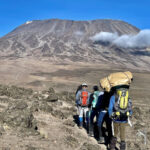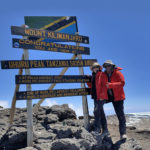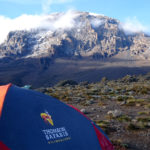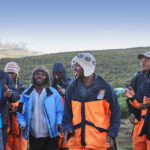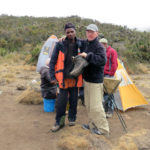When you’re planning and packing for a trek, it may feel like you’re juggling a lot of moving parts, trying to make sure dozens of “must have” items make it into your bags, and up the mountain with you.
But what you bring as a trekker is just the beginning.
 Thomson Safaris porters make their way up to Barafu Camp
Thomson Safaris porters make their way up to Barafu Camp
–
Porters carry not only trekkers’ luggage, they carry the sleeping, dining, and toilet tents; the chairs trekkers rest on in camp; the gear needed to cook up meals, and the food that goes into them.
So how much does all that extra stuff come out to?
Keep in mind, the numbers will vary from trek to trek—a trek with fewer people might have higher “averages” than a large-group trek, for example—but based on a few recent trips up Kili, we can tell our trekkers that for one person to get up the mountain, he or she will need:
- 6 porters: Porters on the mountain don’t just carry bags, they haul everything required to make a trek happen. On a trek with 10-12 people, that works out to about 6 porters to every trekker. (For a solo trek, you’re looking at 15 porters per person!)
- 84 pounds of gear: Camping gear, cooking gear, toilet tents, chairs—on an average trek, the gear required works out to around 84 pounds/person.
- 81 pounds of food: Don’t worry, you won’t come back from Kili with a new spare tire. The food “required” for one trekker takes into account the guides and porters that stay with the group on the mountain.
- 5 pounds of sugar: Again, this number reflects the tea, coffee, and cooking needs of a trekker plus all the porters on the mountain helping him or her out. But that’s still a serious sweet tooth!
- 20 eggs and 2/3 lb. of breakfast sausage: Gotta start the day on Kili with a hearty breakfast, after all!
- 1 whole chicken and 1 pound chicken breast and thighs: You also have to finish the day with a hearty meal.
- ½ pound of cashews: After all, if there’s ever a trail you’re gonna need trail mix on, it’s this one.
All in all, it works out to about 200 pounds/person of luggage, gear, and food going up the mountain with each trekker.
One might say numbers like these lend a certain weight to your achievement in climbing Kili, no?

